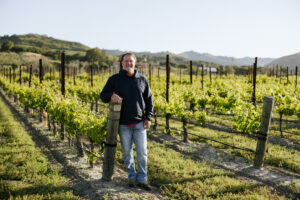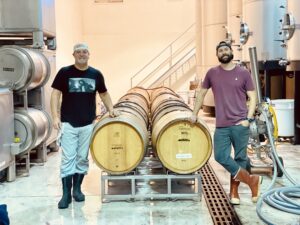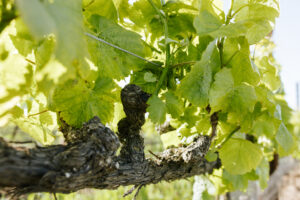Vineyard & cellar updates – JUNE 2024

Chad here, checking in with the latest happenings in the vineyard and cellar…
Cellar-wise, I’m excited to announce that after about three months and 12 potential candidates, we’ve hired a new assistant winemaker – welcome, Garrett Adelman! He is originally from San Diego and most recently spent time working for Cakebread in the Napa Valley. Garrett joined our team in early May and has already proven himself to be enthusiastic, eager, smart, and hardworking. As my sidekick in the cellar, it doesn’t hurt that he loves sports and was raised on the Grateful Dead.

There are so many things I could say about the vineyard right now, but will focus today on a topic I am discussing often with guests at the winery – rainfall. The rainfall this past season was well above average by ~200%, and combined with last year’s totals, we’re above average by ~300%. The rain not only replenishes the water table, it’s also cleaning the topsoil by pushing the salt present in the soil deeper out of the feeding root zone. The results are healthy, green vines that have great energy and vibrancy.

On the flip side, sometimes the amount of rain can be a detriment. If we receive too much too quickly, we get erosion, even flash flooding. Fortunately, we established our cover crop early enough to help prevent a disaster like we experienced in 1998. Some suggest the weather pattern is changing into a La Niña, which will have the opposite effect on us, in lacking rainfall. The life of farming…
This brings up an interesting concept that’s thrown around a lot in the industry – dry farming. This term tends to be associated with higher quality, which I’ve personally always found very misleading. The idea of dry farming your vineyard, depriving your vines from irrigation in order to create a more concentrated berry, is flawed unless you have the perfect conditions. Here’s why:
- In order to have the ability to dry farm, you need to start with a soil type that has water holding capacity, i.e. clay.
- You need to have adequate rainfall, often throughout the year, to moisten your clay soil.
- You need to have roots that are established and deep, basically on their own.
The other side of the dry farm argument is that irrigated vines are somehow waterlogged, producing fat juicy berries that lack flavor and produce thin wines. I feel strongly, and have proven many years over, that you can irrigate and produce concentrated fruit with a highly tuned irrigation practice. I mean, it’s actually the best of both worlds! We get to spoon feed the vines water and food throughout the growing season at any given time, and equally important, starve them as well. To be able to control such an important piece of the puzzle is not only an advantage but also an honor. We are working alongside Mother Nature, and I’m humbled by the joys and challenges this brings.
Final thoughts – I cherish this time of the year when I am traveling less and fortunate to walk the vineyard most days. Early spring was all about growth, sending out shoots and leaves to set the stage for the next step…flowering, which is currently happening. This phase in the vineyard is beautiful and aromatic – it’s truly a special time to be in the Sta. Rita Hills. Book a visit and see for yourself.
Gratefully,
Chad


